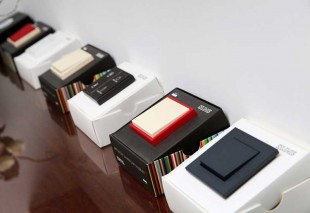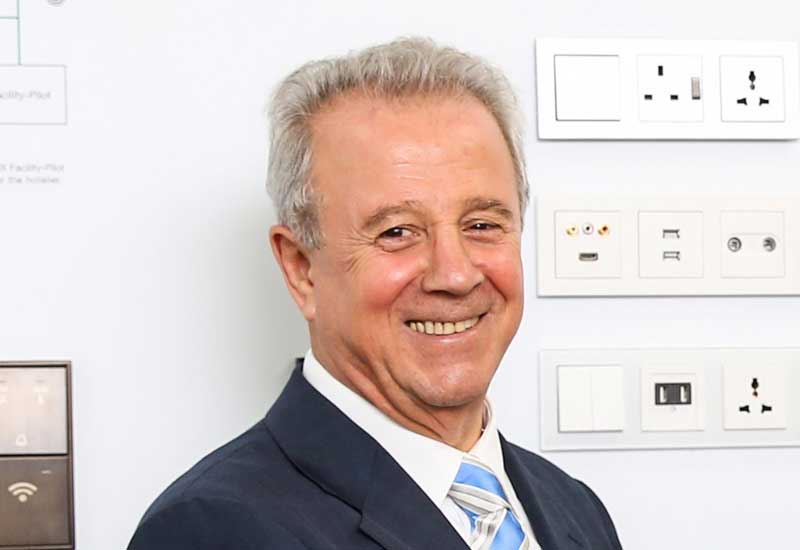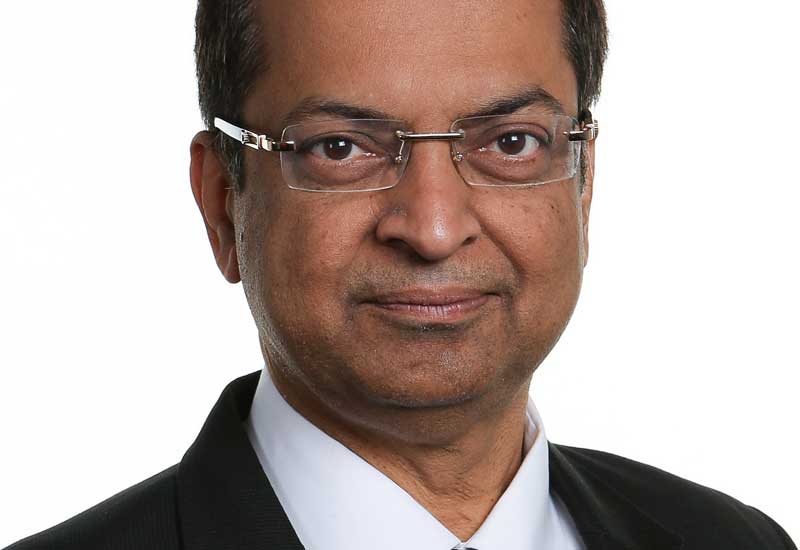

Roundtable: Hotel Technology

Tarek Zakaria, managing director at Jung Middle East DMCC Dubai, UAE
Dilip Sinha, regional general manager of Environmental and Energy Solutions, Honeywell Home and Building Technologies, Middle East, Turkey and Africa (META)
What direction is the hospitality industry moving towards when it comes to technology trends?
Tarek Zakaria: As technology goes, any advancements in the field are aimed primarily to enhance the convenience of the user. And in an industry focused on convenience as much as hospitality, it must be affected to a great extent by these trends and aims to readily integrate them. The latest technologies are deeply rooted in sensing and automation. Nowadays, an example of that is the interest of high-end hotels to integrate motion/presence sensors in rooms instead of the conventional room card switches. This allows for the detection of guests, triggering the energy saving scenes while maintaining standards. i\]Interest in automation being implemented in conventional layouts has been highlighted from guest feedback; it has been shown that using touchscreens and mobile devices are not always preferred, and guests are more inclined to use buttons and switches.
Dilip Sinha: The industry is moving towards a more green, safe and productive future. In fact, the future potential — and the current progress — of regional hotels was highlighted in a recent study by Honeywell, researchers Nielsen and global advisors Ernst & Young in 2016. The Middle East Honeywell Smart Building Score showed that hotels — ranked second after airports — are leading the way for smart buildings in the region compared with other surveyed industries (hospitals, office and residential buildings, education and retail). Hotels scored the second highest across all verticals, leading in all categories that are considered to make a building smart — green, safe and productive — scoring an average of 57 out of a possible 100. Whilst showcasing the overall “smartness” of the region’s hotels, the study also revealed opportunities to drive improvements. The survey evaluated 620 buildings across: Abu Dhabi, Dammam, Doha, Dubai, Jeddah, Kuwait City and Riyadh. There are a range of technologies and trends that could be considered game-changers for the industry. One of these mega trends includes hotels becoming more energy efficient, so they can be environmentally cleaner and save money on bills, while having a positive impact on regional sustainable development plans. Guestroom technology is also key; hoteliers across the region continue to upgrade facilities to elevate their guest’s experience and stay ahead of the competition.
In what ways can technology and its use help a property distinguish itself from ITS competition?
Tarek Zakaria: A property could distinguish itself by integrating various new technologies. For example, energy saving techniques through light and air conditioning control helps in establishing an environmentally-friendly image. Also, another way to distinguish a property is by increasing guest interaction with the controls in the room. This adds a factor of intrigue for guests and makes a lasting impression.
Dilip Sinha: Given the business benefits of smart buildings, hotels that invest in smart, connected technologies are ultimately investing in a more enjoyable guest experience. An efficient, connected hotel is also a more productive asset and hotel operators can gain an edge over competitors by making their processes more efficient through technology.
Are operators overloading the number of gadgets and gizmos placed in rooms?
Tarek Zakaria: While the need for new technologies is present and growing in the region, it is essential to keep the amount of gadgets used at a level which any guest can feel comfortable using. This sheds light on the importance of incorporating technologies while ensuring the layout and labelling of the gadgets is clear and easy to deal with.
DILIP: The point of technology in hotels is not to overwhelm guests. Technology should be implemented so that guests have a more personalised and enjoyable stay and that operations can be as efficient as possible. Technology that integrates naturally and aesthetically into a hotel’s surroundings is key to delivering the right service.
What are the results of your company’s r&d efforts recently?
Tarek Zakaria: At Jung, research and development has been the highlight throughout our 105-year-operation. The foundation of the company was based on the research of the pull switch with 1/8 rotation. As for recent innovations, Jung has introduced a series of thermostats with a wide range of features and designs to revolutionise the way thermostats are perceived in the industry visually and practically. The company has thermostats with displays and automation control push buttons all integrated into a single unit that fits in the conventional installation back boxes, in addition to having the options of horizontal or vertical displays. All these units can be produced within the same design range of the other wiring accessories in a certain project for a cohesive and eye-catching look and premium quality feel.
Dilip Sinha: Honeywell provides comprehensive, integrated technology solutions that help streamline hotel operations, reduce operating costs while ensuring guests stay secure and comfortable. The customer-centric solutions cover a range of integrated products, from cable management systems and high quality wiring devices to guest room management systems, building management systems as well as lighting controls, valves and pressure sensors — all linked to energy efficiency and helping to reduce energy costs. Honeywell’s Inncom solutions are flexible, customisable, efficient and dependable. The company offers a broad range of innovative, intelligent devices and robust integrated systems.
What new products has your company launched in the last year?
Tarek Zakaria: Jung has recently launched a mini sensor which incorporates three bases of sensing into one unit: presence detection, motion detection and brightness control. All these features are packaged in a unit smaller than what the competition has to offer in size for a device with only one of the mentioned sensing capabilities. This aims to evolve the way room access and lighting are considered in automated systems. Additionally, glass touch-enabled thermostats have been introduced to complement the wide range of thermostats available as mentioned before.
Dilip Sinha: In the Middle East, Honeywell has recently introduced the latest in its Honeywell’s Inncom Guestroom Automation System, the Inncom Elements range. The Elements collection is a revolutionary range of stylish wiring devices and guestroom controls products including a selection of products, including thermostats, switches, sockets, and modular projects. Inspired by natural materials the collection can be tailored to meet specific design requirements, with 16 finishing materials and a range of guestroom functions.
There is a perception of high costs when it comes to installing technology in hotels, is this true? Can it justify a tangible ROI?
Tarek Zakaria: It is a fact that installation costs of systems that incorporate automation or technological systems are higher. However, these systems can pack a lot of functions and features into a single unit or in one frame. For comparison, to have eight different light switch controls in conventional systems, you would need a number of installations to incorporate the different circuits to control each of them. But with automation systems, these eight controls can be installed into one unit and therefore saving on the cost of material and different units needed to be installed in conventional systems. That in addition to all the energy-saving features implemented into these new technological systems which makes for a feasible method to cut costs during operation as well.
Dilip Sinha: Implementation of technologies in hotels need to be smart and tailored so that there is a tangible ROI on investment — there is no ‘one size fits all’ approach. Savings on overhead expenses always translate into a better bottom line — heating, cooling and lighting represent a big chunk of that overhead. To keep overheads down, hotels need to invest in cost-efficient energy management solutions that are capable of scaling to individual properties. Inncom’s programmable thermostats allow hoteliers to save money by automatically opening the guestroom temperature band based on room occupancy and rental status. Hoteliers save on HVAC system maintenance and repair as well as on direct heating/cooling costs. If technology is deployed through a personalised approach, hotels can enhance their guest experiences while operating very efficiently and ultimately witness a tangible ROI.
How do you go above and beyond to help hoteliers, making you stand out from the competition?
Tarek Zakaria: What differentiates Jung from other manufacturers is a number of factors which ensure the delivery of a complete product. We offer superior product quality and high precision facilities present in Germany where all the products are manufactured in-house. This aims to give hoteliers peace of mind by getting a product with superior value and which aims to elevate the quality level of the establishment. Jung also incorporates many protocols and technologies so it’s hard not to find the right solution for each client, with a wide range of shapes, colours and finishes offered to meet any designer’s plans. Additionally, through our support we aim to deliver to any hotelier a customised and tailored solution specifically to the project at hand by choosing the right technology or going with conventional systems, picking the right shape and colour for the design, and fitting this in the allocated budget to meet all the requirements. This degree of flexibility, support and quality is unmatched in the industry.
Dilip Sinha: Honeywell’s technology solutions support more sustainable building practices, whether it is managing energy efficiency, creating secure and connected facilities, or generally enhancing guests’ comfort from start to finish. Honeywell is equipped with the tools to support its customers with smart, connected solutions that advance multiple elements of the hotel industry including the design, development, operations and guest experience of hotels.
Meet the experts
Tarek Zakaria, managing director at Jung Middle East DMCC Dubai, UAE
Tarek moved from Germany in 2002 to Dubai, UAE with a mission to develop the Middle East and Africa for smart building automation technology based on the worldwide KNX protocol. Tarek is currently the president of the KNX Association Middle East. He started his career in Germany 35 years ago and graduated in electrical engineering from the Technical Engineering University Bremen in Germany.

Dilip Sinha, regional general manager of Environmental and Energy Solutions, Honeywell Home and Building Technologies, Middle East, Turkey and Africa (META)
Dilip Sinha is the general manager/GBE leader, META (Middle East, Turkey & Africa) region, managing the environmental & energy solutions business of Honeywell. He is responsible for P&L, operations comprising commercial building controls, air and water, residential controls, smart grid, electricity and water metering solutions (HVAC, BMS, electrical products and energy solutions). He has been with Honeywell for over 16 years.
